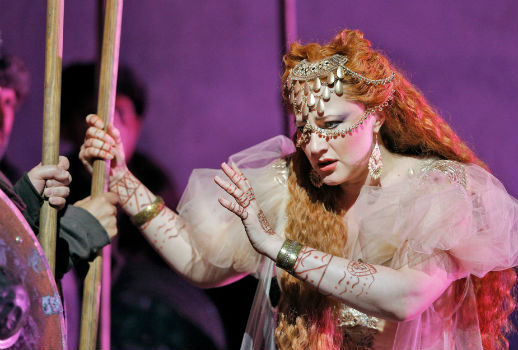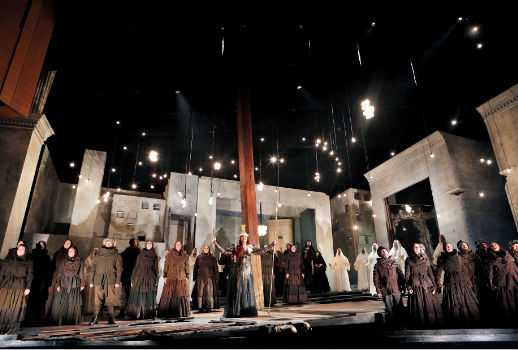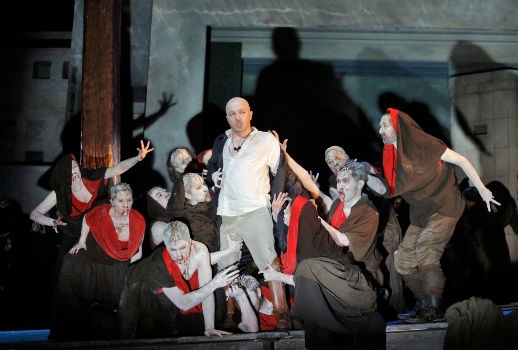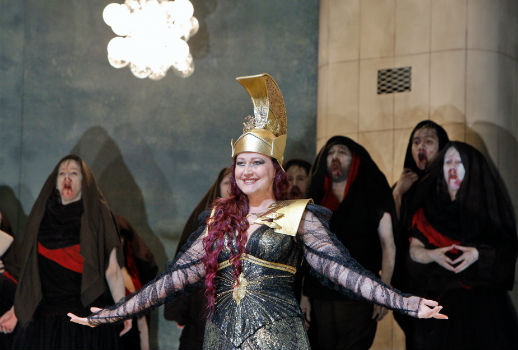

Few first operas indicate a composer’s full potential; when so ambitious a work succeeds on so many levels, there is talent worth developing.
The uncut Oresteia (almost four hours long) now being presented as part of Summerscape at Bard College contains scenes that drag and others that build to a superb ritual burnish. Taneyev’s melodic gifts and brilliant writing for voice, chorus and orchestra suggest he might well have gone on to mightier things.
The opera is based on Aeschylus’ great trilogy about serial murders in a royal house that resulted, as the playwright tells it, in the invention of a civil society based on due process and state-mandated justice rather than individual vendetta. Today, in gun-toting America, we seem to be heading in the opposite direction, egged on by a lot of popular entertainment. (Russia never attained the rule of law in the first place.)
Briefly: Agamemnon, king of Argos (aka Mycenae), abandons his wife Clytemnestra to go besiege Troy. Ten years later, Troy falls and Agamemnon comes home with his Trojan girlfriend, Cassandra, the incredible seer. But Clytemnestra has taken Aegisthus, Agamemnon’s disinherited cousin, as a lover, and she murders the king and Cassandra in the bathhouse. All will be well as long as her son, Orestes, doesn’t show up. A messenger brings news he’s dead, actually. Clytemnestra and Aegisthus can barely contain their delight!
Too soon: Elektra, Clytemnestra’s mother-hating daughter, recognizes the messenger as the long-lost Orestes, and he kills the killers. Now he’s king! Not so fast: The Furies (Eumenides), goddesses of remorse, drive him insane for his matricide. He goes to Delphi—it was Apollo who commanded him to avenge his father. Apollo refers the case to the Athenians, and the jury hangs. Athena steps in to save the day: Orestes is cleansed and the Eumenides become special household goddesses, always honored so they won’t erupt in fury again. Civilization breaks out.

Thus, Aegisthus, mostly offstage in Aeschylus’ trilogy, is on hand in Taneyev’s Act I to retail the ghastly story of Thyestes (his father) being tricked into eating his own children by his brother, Agamemnon’s father, a matter of which classical Greeks needed no reminder. But Russians (and Americans) may well be unfamiliar with the tale, which does not rate even a mention in Strauss’s Elektra (based on Sophocles). Elektra herself is a less important figure here than her mother or her brother, and in the final scenes Apollo and Athena appear as defending counsel and final arbitrator for Orestes and his Furious pursuers.
The cast thus includes mortals (heroic or ordinary), gods, ghosts and, in the Furies, forces of nature. Taneyev, with the precedents of Gluck and Wagner to guide him, is self-consciously high-minded and declamatory. There are no “numbers” in the opera, to the frustration of those in the audience who wanted to applaud a great deal of fine singing but had to hold it till the end.
The texture proceeds grandly, scene by scene. Since we know what’s going to happen, a certain impatience may set in—just as it always does in performances of Agamemnon. Your boyfriend’s back and there’s gonna be trouble! Stop babbling! Grab an axe and hit the showers! But Taneyev is not to be rushed, and neither is his Clytemnestra.
Taneyev’s melodic style is distinctly Russian, leaning more towards Tchaikovsky and Rubinstein than Mussorgsky or Borodin, with some echoes of Rimsky-Korsakov. The style of Gluck’s “reform” operas is apparent in the stately pace of the declamatory speeches. There are few set “numbers,” as there would have been in a Tchaikovsky or Borodin score, and the principals rarely sing together.
Orestes and Elektra have a duet that pleases more if we do not compare it to the shattering “recognition” scene of Strauss’s Orest and Elektra. A quartet, with Clytemnestra and Aegisthus barely concealing their delight at the news of Orestes’ death while Orestes and Elektra delight in the success of their deception, tightens the screw of the drama and gives musical pleasure at the same time.

Clytemnestra has the juiciest role, though Taneyev denies her Aeschylus’ ghostly return to egg the Furies on in the last act. At Bard it is sung by Liuba Sokolova, in a voice of beautifully demonic depths and soaring, sturdy heights—a contralto in my book, though the program calls her a mezzo. (She has sung both Erda and Waltraute.) She has a heart to be hurt or stirred, and when she is in full cry, no one would dare to question her motives. I can’t imagine anyone but a Russian in such a part; they would lack the moral fervor, the exalted phrasing. Sokolova recalls a young Borodina; I hope to hear her in all Borodina’s roles, each by each.
Maxim Kuzmin-Karavaev, who specializes in Mozart and Rossini (I’ve heard him sing Gluck in Rome), looked elegant but seemed underpowered as Agamemnon. His baritone has dignity and attractive color but lacks the weight to deal with such a fire-breathing Clytemnestra. He was more credible in Act II, as his own ghost.
Andrey Borisenko, the Aegisthus (and Apollo), though lacking Kuzmin-Karavaev’s figure, has a more imposing baritone; he broods with polish and threat through the narration of his grievances, a scene director Thaddeus Strassberger has placed in a bathhouse, perhaps so that we can picture it during the next scene, when it will be the site of murder. Andrew Funk (the only American in the cast), a full-voiced bass, sings a number of small roles well, such as the Watchman, Aeschylus’ intriguing invention to kick off his trilogy “from the outside,” so to speak.
The other big role in the opera, however, is Orestes, the tenor, which is sung by Mikhail Vekua. He must maintain his passion full throttle through a long self-introduction, his discovery by Elektra, the confrontation and murder that follow, and still have the power for a third act that is stentorian but (for my money) insufficiently neurotic. Tanayev builds him up but then rather lets us down. The role could easily become monotonous; Vekua has the metal, the phrasing and the dramatic instincts to make us believe it matters to him, even while we find his reunion with Elektra a bit longwinded.

The American Symphony Orchestra under Leon Botstein played the elaborate score in a way that drew praise from all sides. The harp and the horns had especially intricate things to do, perhaps because Tanayev was thinking of lyres and war horns. It was a delight, as always at Summerscape, to encounter a score of such novelty and grandeur in a house the proper size for it, Frank Gehry’s Sosnoff Theater.
Mr. Strassberger, the director, chose that standby cliché, the era of the composer, setting this self-consciously Greek and classical story in Romanov Russia, with beribboned uniforms, housemaids’ frocks, fur hats for the men, and projections of the era’s overfurnishings. This was at least handsome.
Strassberger’s productions for Bard are always inventive (Genoveva, Der Ferne Klang), if they sometimes skirt poor taste (parts of Les Huguenots). He puzzled me here with Agamemnon’s winding purple carpet that circles the small stage instead of heading directly to the portal. Then there was the fire extinguisher Clytemnestra uses to smash the glass door of Agamemnon’s tomb, and the inset parlor where the sight of the royal family dining distracted us from the “recognition duet” in the foreground.
Less distracting, indeed powerfully intriguing, were the shadows cast by the singers on backdrop or curtain, that seemed to imply souls living otherwise than in the words they declaimed or ghosts lingering like unquiet ancestors behind the living. In these shadows, Cassandra looked more Greek and “prepared for slaughter,” Aegisthus more unsettled by onrushing fate in a way that enhanced dramatic tension. The lighting was by JAX Messenger, the set by Madeleine Boyd.
Bravo, Maestro Botstein! Such a pleasure to hear this fascinating if lengthy work, so well sung and well played, and decently staged as well! I hope this is not my last encounter with this opera. (Performances continue through Sunday.)
Photos: Cory Weaver
Reach your audience through parterre box!
parterre box, “the most essential blog in opera” (New York Times), is now booking display and sponsored content advertising for the 2023-2024 season. Join Carnegie Hall, Lincoln Center, Warner Classics and many others in reaching your target audience through parterre box.
parterre box, “the most essential blog in opera” (New York Times), is now booking display and sponsored content advertising for the 2023-2024 season. Join Carnegie Hall, Lincoln Center, Warner Classics and many others in reaching your target audience through parterre box.
-
Topics: bard summerscape, leon botstein, review, thaddeus strassberger
Latest on Parterre
Merry Widow | Finger Lakes, NY | July 25-28
Geneva Light Opera’s production of Lehar’s The Merry Widow will feature prize-winning baritone Bryan Murray and soprano Alexis Olinyk in the superb acoustics of in the landmark Smith Opera House in Geneva, New York on July 25, 27, and 28. A small city on the north end of the largest of NY’s Finger Lakes, Geneva…
Geneva Light Opera’s production of Lehar’s The Merry Widow will feature prize-winning baritone Bryan Murray and soprano Alexis Olinyk in the superb acoustics of in the landmark Smith Opera House in Geneva, New York on July 25, 27, and 28. A small city on the north end of the largest of NY’s Finger Lakes, Geneva…
parterre in your box?
Get our free weekly newsletter delivered to your email.

























Comments